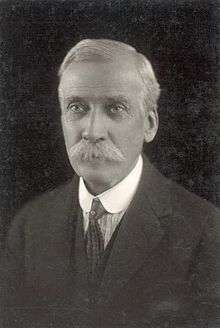Elliot Johnson (politician)
| The Honourable Sir Elliot Johnson KCMG | |
|---|---|
 | |
| Member of the Australian Parliament for Lang | |
|
In office 16 December 1903 – 17 November 1928 | |
| Preceded by | Francis McLean |
| Succeeded by | William Long |
| 4th Speaker of the Australian House of Representatives | |
|
In office 9 July 1913 – 7 October 1914 | |
| Preceded by | Charles McDonald |
| Succeeded by | Charles McDonald |
|
In office 14 June 1917 – 27 February 1923 | |
| Preceded by | Charles McDonald |
| Succeeded by | William Watt |
| Personal details | |
| Born |
10 April 1862 Newcastle, England |
| Died |
8 December 1932 (aged 70) Geelong, Victoria |
| Nationality | Australian |
| Political party |
Free Trade (1903–06) Anti-Socialist (1906–09) Liberal (1909–17) Nationalist (1917–28) |
| Occupation | Sailor |
Sir William Elliot Johnson KCMG (10 April 1862 – 8 December 1932) was an Australian politician and Speaker of the House of Representatives.
Johnson was born at Newcastle upon Tyne, England, the son of a scene-painter. He ran away from home at 13, worked in the telegraph office at London, and afterwards assisted his father scene-painting at Covent Garden theatre. He was then apprenticed on a sailing-ship and after obtaining his second mate's certificate, settled in Sydney in 1883. He took much interest in the free-trade movement and was also a follower of Henry George.[1][2]
In December 1903 he was elected a member of the federal House of Representatives for Lang. He was from 1910 to 1913 whip and secretary to the Liberal party[3] and was a member of the panel of Deputy Chairmen of Committees. He took much interest in the selection of the site for the federal capital, and nominated the Yass-Canberra site which was eventually chosen. In 1911 he was one of the Australian parliamentary representatives at the coronation of King George V.
He was elected Speaker of the House in 1913 and held this position until after the 1914 election. He was again Speaker from June 1917 to February 1923, when William Watt was chosen for the position. Johnson was a man of great industry who made it his business to be thoroughly acquainted with the subjects under debate. He was particularly interested in the question of immigration. As Speaker he was quietly dignified, courteous and efficient.
He was defeated at the 1928 general election. He died at Geelong, Victoria, in 1932. He married, but his wife died before him. He was survived by a daughter. He was created a Knight Commander of the Order of St Michael and St George (KCMG) in 1920.[1]
In private life his hobby was painting and etching. A set of his etchings is at the National Library of Australia, Canberra.[1]
References
- 1 2 3 Serle, Percival (1949). "Johnson, William Elliot". Dictionary of Australian Biography. Sydney: Angus and Robertson. Retrieved 2008-11-17.
- ↑ Hawker, G. N. (1983). "Johnson, Sir William Elliot (1862–1932)". Australian Dictionary of Biography. Canberra: Australian National University. Retrieved 17 November 2008.
- ↑ "Federal Opposition: Deakin To Be Leader". The Sydney Morning Herald. 2 July 1910. p. 13. Retrieved 12 August 2013.
| Parliament of Australia | ||
|---|---|---|
| Preceded by Charles McDonald |
Speaker of the Australian House of Representatives 1913–1914 |
Succeeded by Charles McDonald |
| Preceded by Charles McDonald |
Speaker of the Australian House of Representatives 1917–1923 |
Succeeded by William Watt |
| Preceded by Francis McLean |
Member for Lang 1903–1928 |
Succeeded by William Long |